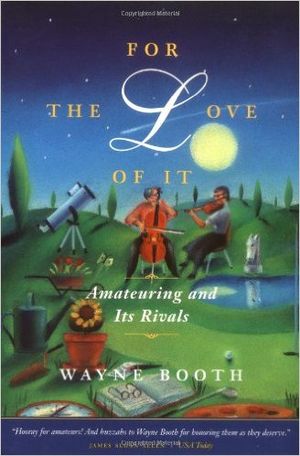Book Reviews
For the Love of It: Amateuring and Its Rivals
/https://tf-cmsv2-smithsonianmag-media.s3.amazonaws.com/filer/a9/c1/a9c12414-5434-4f9a-b183-0cbb6f420c75/51ybgymeahl_sx327_bo1204203200_.jpg)
For the Love of It: Amateuring and Its Rivals
Wayne Booth
University of Chicago Press
They're all out there — individuals pursuing passionate interests with intensity and no hope of gain: Sunday painters at their easels (Winston Churchill was the most celebrated among them); scholars who work outside academe; athletes devoted to Saturday afternoon pickup games; poets crafting sonnets that may never be published and creating stand-up verse at poetry slams. Booth, who is professor emeritus of English at the University of Chicago, has produced a "joyous exploration of the ‘why' of amateuring," any kind of amateuring. (Amateuring's main rival, he contends, is a society where money and celebrity are prized above everything else.)
It must be stated at the outset, though, that the author's concentration on, indeed near-obsession with, the most challenging of classical music, and the cello, gives the musically gifted reader a distinct advantage over other would-be amateurs with less of an ear for complex musical composition. Booth himself concedes that "no one in midlife is likely to take up any instrument, let alone the cello, without having fallen in love with music long before." Nevertheless, he succeeds in conveying the pleasure of relinquishing a corner of one's life to something that is, purely in itself, challenging — and also fun.
Booth's own love of music has a long history. "Musical memories are among my earliest," he writes. "Judging from the way my family lived, it's obvious that music must have filled my ears and soul even in the womb." As a youth he had singing, piano and clarinet lessons. Then, in 1952, at the age of 31, he began playing the cello. From that moment, his love of the instrument has been matched only by the gnawing self-doubt that permeates his book. Early on he asks, "Just what is the purpose of amateuring...if full success...is always out of sight?" The rewards, he discovers, are "joyful friendship, spiritual ecstasy, gratitude for life's mysterious unearned gifts."
Booth can become so carried away by his love for the cello that the reader gets lost in a thicket of details; his saving grace is that he can laugh at himself. At the age of 16, he confesses, he proudly recorded in his diary, "I have been accepted for membership in the Book-of-the-Month club!" And though he is quick to bemoan the fact that the ordinary man prefers Muzak to Beethoven, spends too much time watching "other people trying to become champions" and works for money rather than love, Booth admits that some of his own life choices have not been made solely "for the love of it." "My salary at various moments affected both whom I taught and what," he admits. Though a firm believer that high school teaching is more important than college teaching, Booth let the better pay at the university keep him with students who "needed me much less than did the sophomores in any neighboring high school."
Booth's writing is at his best, and he at his most likable, when he stops analyzing and lecturing and simply pours out his passion for the instrument and the music he plays. "Since all other motives — fame, money, power, even honor — are thrown out the window the moment I pick up that cello bow, the only plausible reason for doing it is that overworked word ‘love,' the irresistible motive that leads in mystifying ways to both intense pleasures and intense pains. I do it because I love doing it, even when the results are disappointing. I do it to do it."
In the end, Booth concludes, "whatever path we choose, whatever our successes or failures, the good news is that re-creation is available to most of us." The history of human cultures, he observes, demonstrates that life, for many individuals, can be "at least partly redeemed by the song of the amateur....Every gardener or painter or poet or dancer or stargazer" is a participant in this continuum. Meanwhile, for his part, "how glorious it feels...to welcome friends with their instruments" and spend an afternoon or evening making music.
It is a pity the book does not include a CD of one of the performances that have brought Booth some of that intense pleasure. The reader longs to hear him perform the music he so clearly, and dearly, loves.
